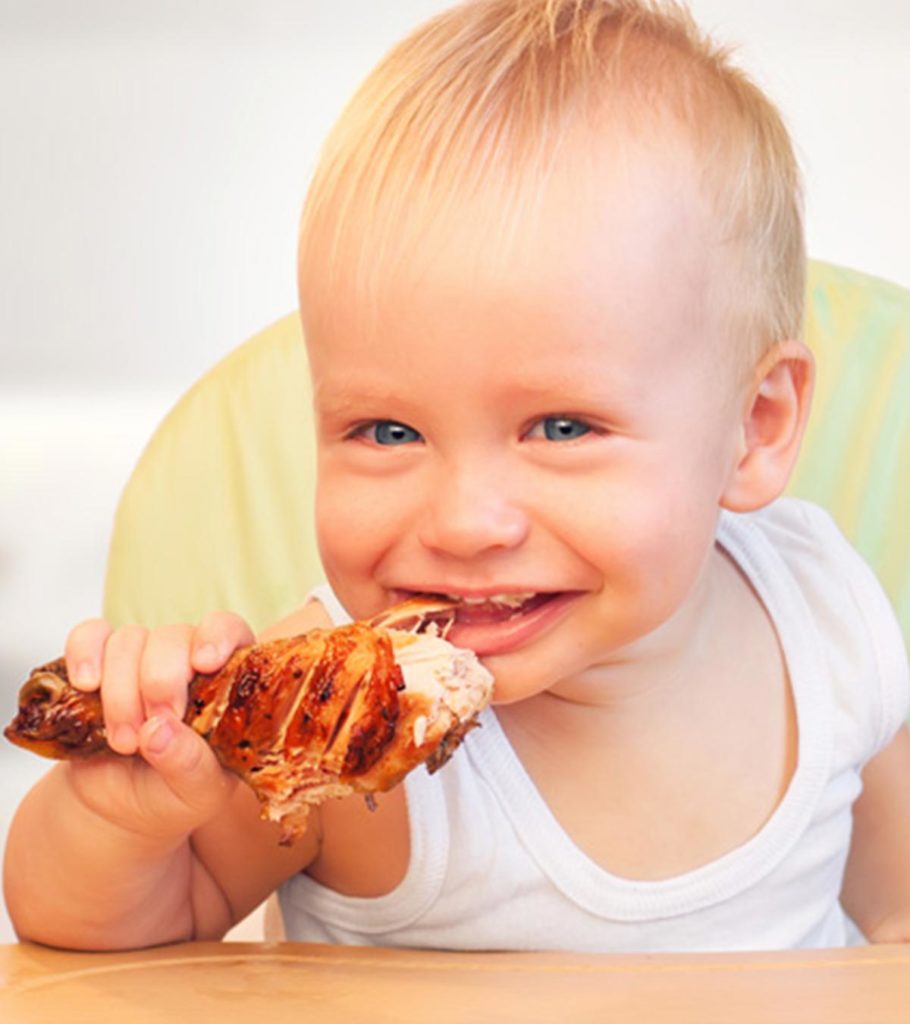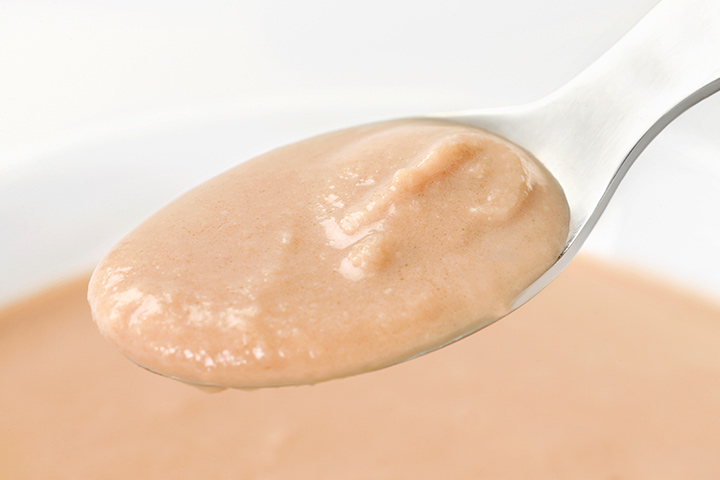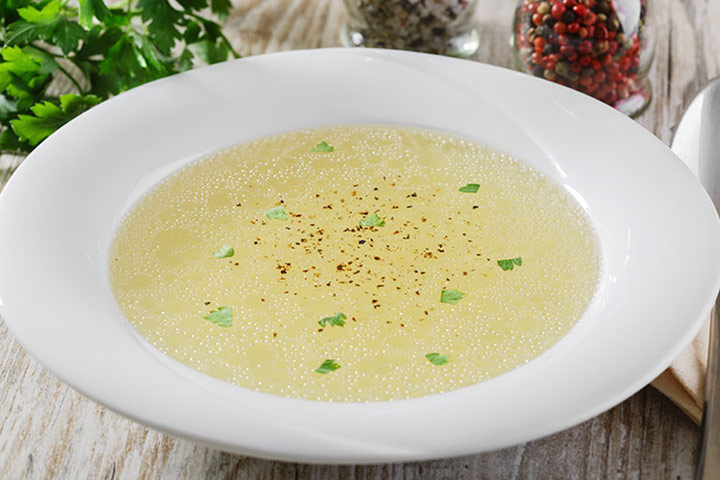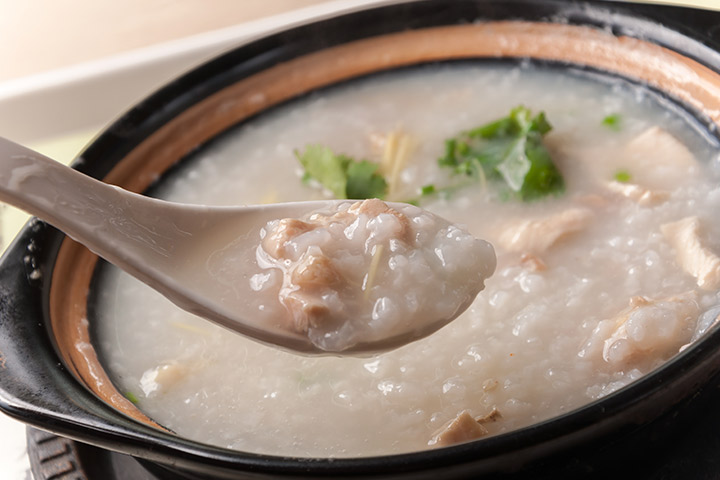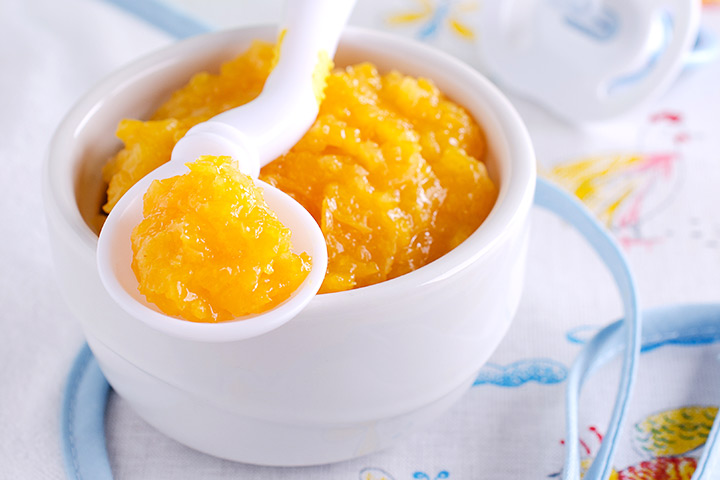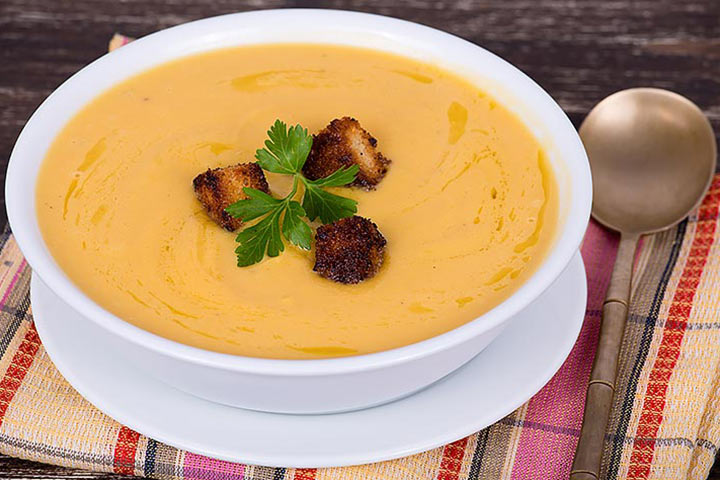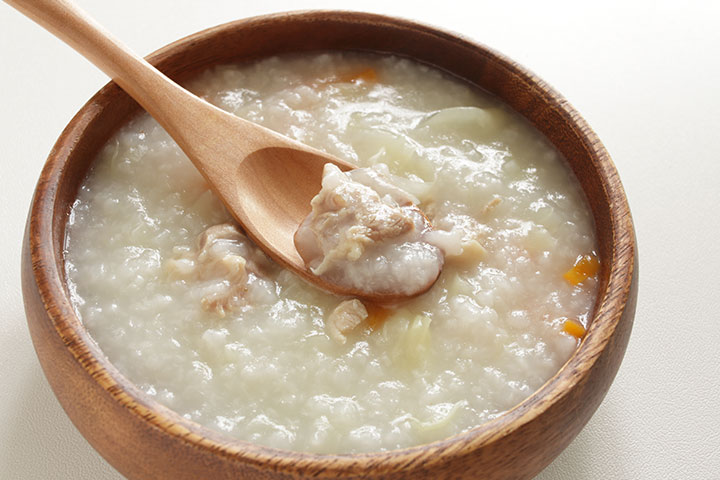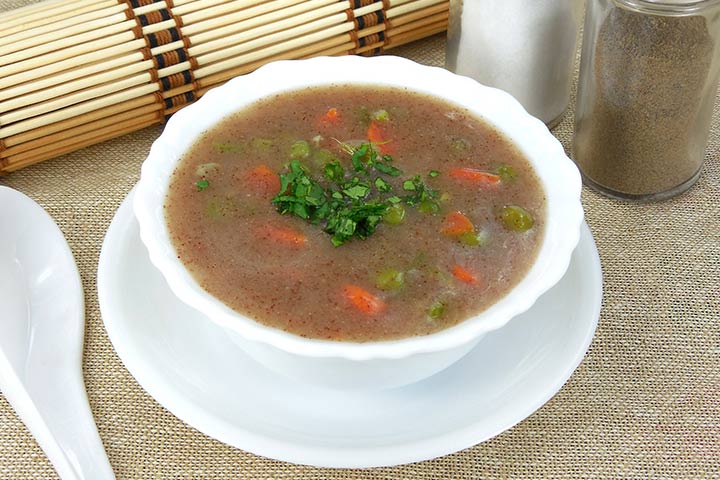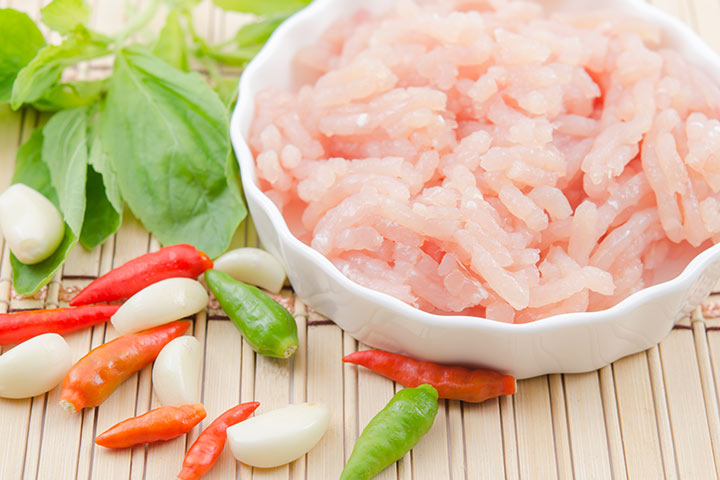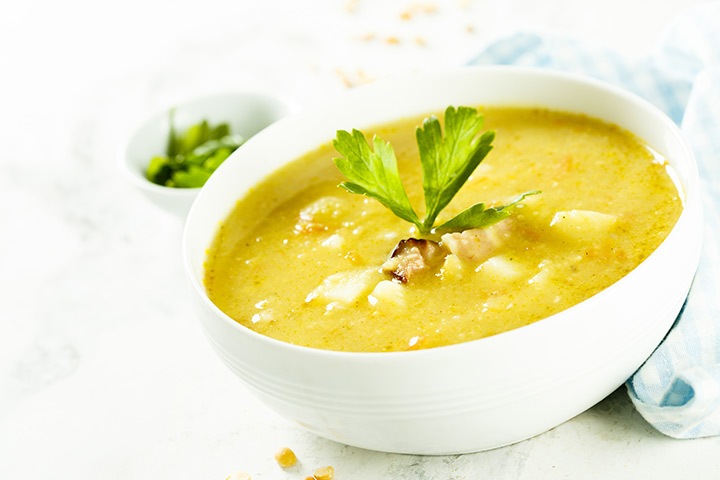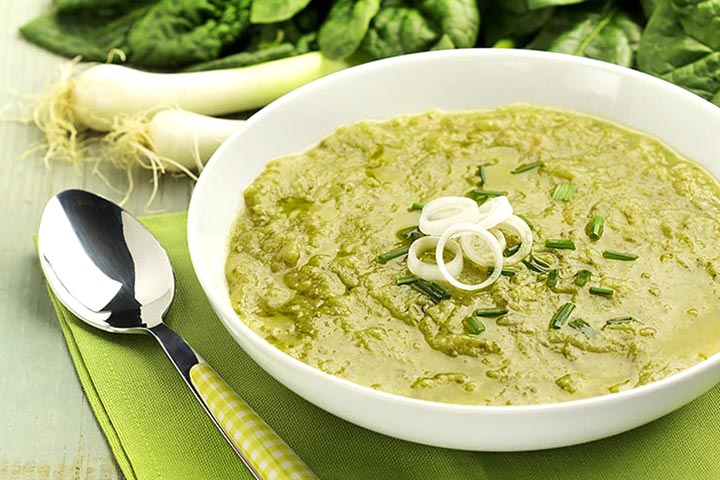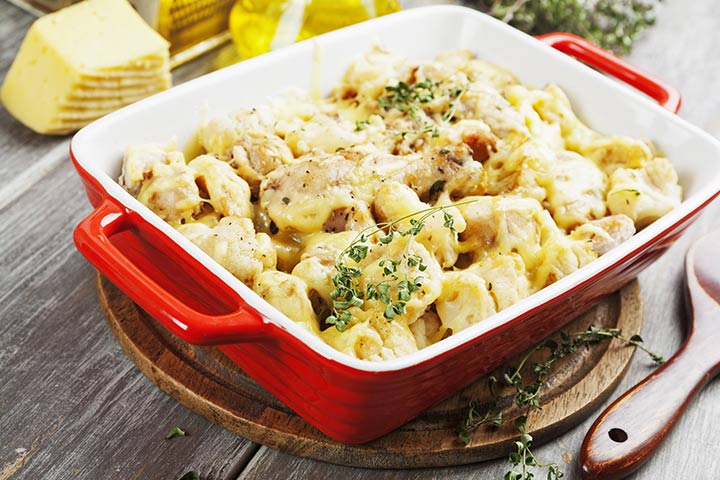Fruits and vegetables are great nutritional sources, but as a non-vegetarian parent, you may want to introduce your infant to chicken as soon as possible, so you search for healthy chicken recipes for babies. Chicken has various nutritional advantages due to its low fat and high protein content. It also works well as finger food for babies. However, while introducing chicken to your baby’s diet, you need to know when you may serve chicken to your baby. Read this post to learn about the health advantages of chicken for newborns, as well as some easy baby-friendly recipes to try.
When Can Babies Eat Chicken?
A baby can start eating chicken from the sixth month, which is when solid foods are introduced in their diet (1). Begin with two servings of pureed chicken per day with each serving not greater than two tablespoons. Gradually increase the portion size.
Health Benefits Of Chicken For Babies
Chicken can be an excellent baby food thanks to its numerous nutritional properties:
- Healthy muscle growth: 100g of chicken contains 18.6g of protein, which gets concentrated during the cooking process and increases in quantity. Proteins are essential for a baby’s growth since they facilitate muscle growth. Also, proteins from animal sources unlike plant sources are easily digestible and readily absorbed by the body (2).
- Improves the circulatory system: Chicken contains iron which is necessary for the growth of red blood cells. It is rich in potassium, which keeps the heart and blood vessels in good condition.
- Great for the bones: 100g of chicken contains 15mg of calcium and 182mg of phosphorus. Both these minerals play a significant role in the formation of strong bones.
- Vitamins facilitate brain development: Chicken is rich in vitamins including C and A. It also contains vitamin B12, also called cobalamin, which is essential for brain development in infants (3).
- Micronutrients for healthy immunity: Chicken contains micronutrients such as zinc and magnesium, which play a significant role in maintaining healthy immunity.
Nutritional Value Of 100g Of Chicken, (broiler or fryers, breast, skinless, boneless, meat only, raw)
| Nutrient Unit Value Per 100g | |
|---|---|
| Energy | 120Kcal |
| Protein | 22.5g |
| Fat (total lipid) | 2.62g |
| Calcium | 5mg |
| Iron | 0.37mg |
| Magnesium | 28mg |
| Phosphorus | 213mg |
| Potassium | 334mg |
| Sodium | 45mg |
| Zinc | 0.68mg |
| Vitamin B1 (Thiamin) | 0.094mg |
| Vitamin B2 (Riboflavin) | 0.177mg |
| Vitamin B3 (Niacin) | 9.6mg |
| Vitamin B6 | 0.811mg |
| Vitamin B9 (Folate) | 9µg |
| Vitamin B12 | 0.21µg |
| Vitamin A | 9µg |
| Vitamin D | 0.2µg |
| Vitamin E | 0.56mg |
Source:United States Department of Agriculture (4)
How To Select And Store Chicken?
- Select: Always buy fresh chicken from a hygienic store where it is cleaned and dressed well. This is particularly crucial when considering the health of infants, as any meat, including chicken, is prone to bacterial contamination. The Centers for Disease Control and Prevention (CDC) reports that approximately one million individuals fall ill annually due to consuming contaminated poultry in the US. Therefore, never buy frozen varieties of poultry as these could contain pathogens that may potentially harm the infant.
- Choose fresh, organic chicken where the bird is fed only natural food, which is free of antibiotics and hormones. Never buy salted or packaged chicken, which is processed with preservatives.
- Storage: Buy only as much as you need to cook for the baby . Do not freeze leftover chicken or the chicken baby food since bacteria can propagate easily in it.
How To Process Chicken For Babies?
Following are the best ways to cook chicken for your baby.
1. Bake
Step 1: Preheat the oven to 375ºF (190ºC).
Step 2: Cut the chicken into small pieces so that it bakes thoroughly and evenly. 1lb or 453g of chicken takes about 20 minutes to cook properly.
Step 3: You can coarsely puree the chicken with water after it is baked. For toddlers, you can shred the chicken into tiny pieces and serve it as finger food.
2. Boil
Step 1: Cut the chicken into small pieces and completely submerge them in water in a boiling pot.
Step 2: Boil for 30 minutes or longer and then puree the chicken.
3. Poach
Step 1: Cut thin slices of boneless chicken and place them in a saucepan with just enough water to submerge them.
Step 2: Bring the water to boil, and then simmer for 20 minutes or till the chicken is completely tender.
Step 3: Puree the chicken slices with water or strain the nutrient-rich water to use in other baby foods.
Poaching is similar to boiling; only it uses shallow water and thin chicken fillets. Boiling is probably the best way of cooking chicken since it softens the meat for easy pureeing and even kills pathogens better.
Since now we know how to process chicken, let us look at some recipes.
Nutritious Chicken Recipes For Babies
Following are some of the best homemade baby food chicken recipes that are easy to prepare and also nutritious for a baby:
1. Chicken puree
It is a classic chicken baby food recipe that is widely popular. Pureed chicken for babies is quick and easy to make.
Ideal for age: 6 months and above
You will need:
- 2 cups of chopped boneless chicken
- 3-4 cups of water
How to:
- Put chicken in a boiling pot or pressure cooker, and cook until the chicken is tender.
- Cool and transfer it in a blender with water. Blend to the desired consistency.
- If you have used poached, steamed, or roasted chicken, cut it into smaller pieces and blend it with boiled water. To make chicken soup, add more water.
2. Chicken stew
Preparing chicken stew or chicken broth for babies is similar to making a puree, but the focus is on water. It is for babies who prefer liquid first foods over solid ones. We use chicken with bone (as bone broth) as it contains essential minerals. The solids are later discarded.
Ideal for age: 6 months and above
You will need:
- 3-4 cups chicken with bone
- 7-8 cups of water
How to:
- Boil chicken thoroughly in a pot or pressure cooker. Cook for 25-30 minutes as it leaches all the nutrients into the water.
- Once cooked, let the stew cool, and then strain the liquid using a sieve. The highly nutritious chicken stew is ready.
3. Chicken and rice porridge
Rice is rich in carbohydrates, which is an excellent energy source for your growing baby.
Ideal for age: 6 months and above
You will need:
- 2 cups of chopped boneless chicken
- 2 cups rice
- 1 cup mashed banana
- 4-5 cups of water
How to:
- Boil chicken while cooking the rice separately.
- Once the chicken and rice are cooked, transfer them to a blender with excess water. Since it is porridge, you could add mashed banana for sweetness.
- Blend rice, chicken, and mashed banana till desired consistency.
4. Chicken and apricot puree
Apricots are sweet, delicious, and make a fantastic accompaniment to chicken.
Ideal for age: 6 months and above
You will need:
- 2 cups of finely chopped sweet potatoes
- 2 cups boneless chicken
- 3-4 cups of water
How to:
- Boil the chicken and cook apricots separately, until both ingredients are tender.
- Put both in a blender and blend into puree. Add water if you want to thin the consistency.
Chicken baby food recipe with the similar cooking process:
- Chicken and apple puree: You can prepare a chicken and apple puree the same way. Introduce apples from nine months or above only.
5. Chicken and sweet potato puree
Sweet potatoes are rich in vitamins, and so is chicken, thus, making it a perfect multi-vitamin puree for the baby.
Ideal for age: 6 months and above
You will need:
- 2 cups of finely chopped sweet potatoes
- 2 cups boneless chicken
- 3-4 cups of water
How to:
- Cook the chicken and sweet potatoes separately until they are completely soft and tender.
- Blend them to get the desired consistency.
Chicken baby food recipes with the similar cooking process:
- Chicken and potato puree: Replace sweet potato with regular potatoes to make a delicious chicken and potato puree. Sweet potatoes and potatoes should be introduced in baby foods from six months and above.
- Chicken and beetroot puree: Beetroot is rich in minerals and several micronutrients. Combine with chicken for a delicious baby food. Ideal for six months and above.
- Chicken and peas puree: Peas taste great when combined with chicken in a baby food. Introduce peas to the baby only after ten months.
6. Chicken and sago (sabudana) porridge
Sago pearls or sabudana is light on a baby’s stomach. Their neutral taste makes them an excellent base for porridge with chicken.
Ideal for age: 6 months and above
You will need:
- 2 cups sago pearls
- 2 cups boneless chicken
- 4-5 cups of water
How to:
- Boil chicken and sago pearls separately until they are tender.
- Once tender, move both the ingredients into a blender and blend coarsely. Once done the porridge is ready to serve to an infant.
7. Chicken and finger millet (ragi) porridge
Ragi is rich in minerals and makes a great accompaniment to cooked chicken.
Ideal for age: 6 months and above
You will need:
- 2 cups finger millet flour
- 2 cups boneless chicken
- 4-5 cups of water
How to:
- Boil water and millet flour together. Simmer and cook for five to seven minutes, stirring continuously to prevent lumps.
- Boil chicken separately, and once done transfer it to a blender along with the cooked millet flour. Blend till you achieve the desired consistency else add more water.
8. Minced chicken
Minced chicken can be a great finger food for your baby. In fact, finely chopped chicken is recommended as the first finger foods for a baby by The American Academy of Pediatrics (5).
Ideal for age: 9 months and above
You will need:
- 3 cups of boneless chicken
- 1 cup of water
How to:
- You can buy minced chicken or buy boneless chicken and mince it yourself after cooking. The latter option is better since you have a choice to mince the chicken very fine or leave it coarse.
- Start the preparation process by cooking the chicken in a pressure cooker. Once done, transfer it to a blender and blend coarsely. The baby should be able to pick the pieces by himself.
- If the minced chicken seems dry, then add a cup of water and blend again. It makes the meat soft and easy to digest for the baby.
9. Chicken and lentil puree
Lentils are rich in proteins and so is chicken, which makes this chicken baby food an excellent protein food.
Ideal for age: 10 months and above
You will need:
- 2 cups cleaned pigeon pea (toor dal)
- 2 cups boneless chicken
- 5-6 cups of water
How to:
- Cook the pigeon pea/toor dal in a pressure cooker thoroughly. Boil the boneless chicken separately until tender.
- Add the cooked pigeon pea and boiled chicken in a blender and blend to get desired consistency.
10. Chicken and spinach puree
Chicken tastes great with spinach, and even your baby can enjoy this delicious food combination.
Ideal for age: 12 months and above
You will need:
- 2 cups chopped spinach
- 2 cups boneless chicken
- 4-5 cups of water
How to:
- Boil the spinach and boneless chicken separately. Once the spinach is cooked, sieve it and discard the water because it contains oxalic acid, which is not good for the baby’s kidneys (6).
- Blend the cooked spinach and boiled chicken till you achieve the desired consistency.
11. Chicken casserole
Chicken casserole for babies is the same as the casseroles which adults eat with some modifications to the method of preparation and presentation so that it suits the little one’s digestion.
Ideal for age: 12 months and above
You will need:
- 2 cups finely chopped onions
- 2 cups finely chopped carrots
- 2-3 cups diced potatoes
- 4-5 cups finely chopped boneless chicken
- 3-4 teaspoons of sunflower oil
- 3-4 chicken stock
How to:
- Fry chicken with the vegetables till they are brown and well-cooked. In a separate dish, boil some chicken to make stock.
- Transfer the chicken and vegetables into a casserole dish and cook in the oven at 350ºF or 180ºC for an hour.
- Once the casserole has cooled, you can serve in two ways – cut it into tiny pieces or cubes to serve as finger food or blend coarsely with chicken stock to make a thick puree.
Those were some great chicken baby food recipes that are tasty and healthy. However, you also need to be careful about probable allergies towards chicken.
Can A Baby Be Allergic To Chicken?
Chicken has the potential to trigger allergies in infants with sensitive immune and digestive systems. Cooking chicken reduces its allergenicity (7). You must be vigilant and look out for any signs of allergy. Below is a list of the symptoms of chicken allergy.
- Swollen face and neck: The face swells up especially around the eyelids, nose, and throat. The baby may be unable to open his eyes and could have difficulty in breathing.
- Abdominal pain: The baby writhes in pain and may have diarrhea and vomiting.
- Skin hives or rashes: Tiny red bumps in clusters appear all over the body, which are itchy.
- Fatigue and weakness: The baby appears weak and does not play.
If you notice any of the above symptoms, take your baby to the doctor.
Chicken is considered to be a nutritional addition to your baby’s diet as it is a reliable source of protein and is also rich in vitamins, antioxidants, and other essential nutrients. You can start feeding your baby chicken after they have started solids and are about six months of age to aid in their healthy bone and muscle development. We have also included a few recipes of chicken dishes that you can try making for your babies with simple and easy ingredients already available at your disposal.
Key Pointers
- Babies can start eating pureed chicken at six months, with two servings of not more than two tablespoons initially, gradually increasing portion size.
- Chicken is an excellent source of protein, iron, potassium, calcium, phosphorus, vitamins, and micronutrients, which all aid a baby’s growth and development.
- To ensure safety, choose fresh, organic chicken from a clean store, and avoid frozen or packaged varieties.
- Cook chicken for your baby by baking, boiling, or poaching it, and puree or shred it according to different ages.
